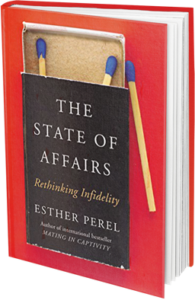
By Chris Cuomo
CHRIS CUOMO: I want to pose a question that you ask in the beginning of your book: “Where should we begin?” Taking people through this topic, where’s the right place to start?
ESTHER PEREL: It’s a subject that is ubiquitous. [Adultery is] the only commandment that is repeated twice in the Bible—once for doing it, and once just for thinking about it. It has existed since marriage was invented, yet is often treated with judgment, in very polarizing ways. I thought, we can do better. We need a new conversation that helps people deal with this crisis.
How do you explain infidelity?
I look at the relationship in its entirety. Two people are responsible for the relationship; one person chooses to have an affair, but sometimes these experiences have nothing to do with the relationship.
How can they have nothing to do with the relationship?
The majority of people I see are not chronic philanderers. They are people who have often been faithful for years, decades, who find themselves crossing a line they never thought they’d cross. One of the big assumptions that guides the conversation at this moment is that affairs are a symptom of a problem relationship—either there is something wrong in your relationship or there is something wrong in you. But in fact, sometimes the meanings and the motives have to do with loneliness, resentment, rejection and sexual frustration. And sometimes it has nothing to do with that.”
Is marriage a hard thing for people to be in successfully over a long time?
Our model today is, “I want you to be whatever I always wanted from marriage: companionship, economic support, family life, social status. I also want you to be my best friend, my trusted confidant, my passionate lover for the long haul. I want you to be the best parent, my intellectual equal, the one to inspire me in my career. I want you to be my anchor, my wave. I want you to offer me security and stability and predictability and I want you to give me transcendence and awe and mystery and surprise.” It’s one person to give us what once an entire village would provide.
You say that there are three components to infidelity: secrecy, sexual alchemy—which would be a great name for a band, by the way—and emotional involvement. How do those components play out?
Any infidelity is organized around secrecy. Emotional infidelity is about going to someone else to share parts of yourself. The most interesting one for me was the concept of sexual alchemy: When I asked people all over the world what they experience in infidelity, they said that they feel alive for the first time in a long time. They experience a sense of energy, of renewal, of vitality.
The immediate pushback is, “You are so selfish. You don’t think that I wanted to feel alive? And now by the way, you killed me essentially, so now you’re alive and I’m dead because of what you did.”
That’s right. It is selfish. Affairs are plots of entitlement, things that you give to yourself with a host of rationalizations for why you deserve it. Every organism needs to grow in order to thrive. If it goes stale, it will fossilize. In the beginning of a relationship, you live face-to-face and then you spend years living side by side. What this crisis of infidelity does to some people is it puts them back face-to-face, and shows them what they stand to lose. It’s part of the conversations that you wish people would have when things are good, not after a crisis. I imagine a world where people can experience a sense of vitality and aliveness in relationships because—more than anything else—the quality of our relationships determine the quality of our lives.




